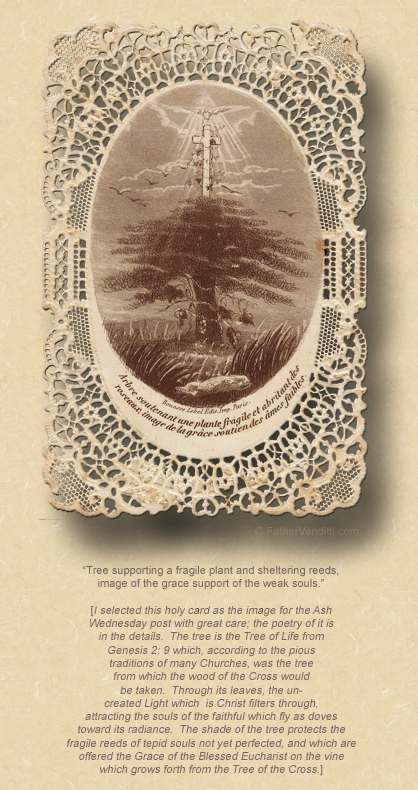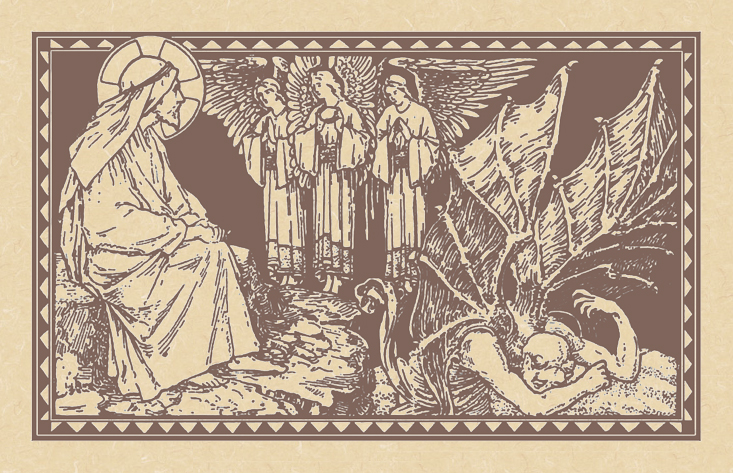Don't "Give Up Something" for Lent … Unless It's Yourself.
Ash Wednesday.
Lessons from the feria, according to the ordinary form of the Roman Rite:
• Joel 2: 12-18.
• Psalm 50 (51): 2-6, 12-14, 17.
• II Corinthians 5: 20—6:2.
• Matthew 6: 1-6, 16-18.
Lessons from the feria, according to the extraordinary form of the Roman Rite:
• Joel 2: 12-19.
• Psalm 56: 2, 4.
• Psalm 78: 8, 9; and 102: 10.*
• Matthew 6: 16-21.
The First Wednesday of the Great Fast; and, the Feast of the Holy Martyr Charalampas.
Lessons for the Presanctified,** according to the Ruthenian recension of the Byzantine Rite:
• Genesis 1: 24—2: 3.
• Proverbs 2: 1-21.
FatherVenditti.com
|
 8:48 AM 2/10/2016 — Those of you who hear Mass in the extraordinary form from time to time no doubt know that we have just concluded what is called the Septuagesima Season, named after the first of the three weeks that comprise it. In the Byzantine Tradition, in which I served for many years, it's called the Triodion. In fact, a pre-Lenten season is a part of almost every Christian Church that has any kind of liturgical tradition; even the more traditional forms of the Anglican and Lutheran Churches observe it. It was suppressed in the ordinary form of the Roman Rite in the reforms following the Second Vatican Council, making the ordinary form the only major Christian Tradition now not to observe it, and I won't hide from you the fact that I think that was a great mistake: not only does it separate most of the Latin Church from the rest of Christendom doing damage to the cause of Christian unity, it also denies certain spiritual realities; but, for those of you whose experience is only with the post-Vatican II liturgy, the idea of a pre-Lenten penitential season might seem foreign and just a bit of overkill. 8:48 AM 2/10/2016 — Those of you who hear Mass in the extraordinary form from time to time no doubt know that we have just concluded what is called the Septuagesima Season, named after the first of the three weeks that comprise it. In the Byzantine Tradition, in which I served for many years, it's called the Triodion. In fact, a pre-Lenten season is a part of almost every Christian Church that has any kind of liturgical tradition; even the more traditional forms of the Anglican and Lutheran Churches observe it. It was suppressed in the ordinary form of the Roman Rite in the reforms following the Second Vatican Council, making the ordinary form the only major Christian Tradition now not to observe it, and I won't hide from you the fact that I think that was a great mistake: not only does it separate most of the Latin Church from the rest of Christendom doing damage to the cause of Christian unity, it also denies certain spiritual realities; but, for those of you whose experience is only with the post-Vatican II liturgy, the idea of a pre-Lenten penitential season might seem foreign and just a bit of overkill.
Most of you know that I just got back from a vacation, which I spent in a warm place, and took the opportunity to go swimming. But I hadn't been swimming in a long time and wasn't quite used to it, so instead of just diving right in—if you can stomach to picture such an ungraceful image—I eased myself into the water gradually, splashing myself a little bit as I waded more and more into the water. That's what the Septuagesima season is: it's a gradual reintroduction to the disciplines of the fasting and mortification of Lent.
In the Eastern Churches, the last two weeks of pre-Lent have very peculiar sounding names: Meatfare week and Cheesefare week, Meatfare being the last week during which they eat meat, and Cheesefare being the last week they eat dairy products, abstaining from both throughout the whole of Lent; and, they call the faithful of those Churches to focus on very concrete things for a reason. Jesus didn’t just sit down and think about what it would be like to fast for forty days in the desert, and then contemplate how that might change him; he actually went there and actually fasted. And while we might be thankful that we are not Eastern Christians and don't have to do that kind of fasting, the relevancy of that example should not be dismissed out of hand. If my Lent consists of: “I’ll give up desserts; I’ll cut an hour of my TV time; I’ll say an extra ten minutes of prayers each night…,” that’s nice, but it’s not Lent, because it’s all just symbolic. That's why I've never been a particular fan of the pedestrian notion of "giving up something" for Lent. A symbol, whether it be a picture or a word or a symbolic act, no matter how meaningful it may seem to us, is still just a ghost. If it has no substance, it cannot change me concretely. But if my Lent is not just a symbol, if it is something which I allow to completely reorient my life, turning me away from the things of this world toward the things of God to the extent that my state if life permits, then over the course of a lifetime of Lents it can make the difference between heaven and hell. And that—at the risk of sounding amusingly tempered—is not insignificant.
Which brings us to the Gospel lesson for this day, which, on the surface, seems little more than some pragmatic admonitions by our Lord about the sincerity of our penitential acts: don't make a show in giving alms, don't make a spectacle of yourself when you pray, don't alter your appearance so everyone can see your mortification; nothing that we all don't know instinctively, though it does sometimes lead us to be a little judgmental of others: we go to work or to the store on Ash Wednesday and we see people walking around with enormous crosses of ash smeared on their foreheads, and we find ourselves thinking, “Is that person really living a Christian life, or is he or she just thinking superstitiously, that getting ashes smeared on his head is some kind of magic charm that will protect him from “cooties”? Then, if we're lucky, we realize that that kind of judgmental-ism is not at all in the spirit of Lent, and we stop ourselves. This happens to me all the time, when some simple soul will come here to the Shrine and be moved by what he or she experiences, and ends up in front of the statue of the Immaculate Heart, blurting out prayers or songs out loud for all to hear; it's very difficult for me not to judge that person rather harshly and presume they're doing it to be seen and not simply out of devotion, since true devotion has no need to be seen by others, as our Lord Himself explains in the Gospel lesson. But then I have to stop myself and recognize that I don't have the gift of knowledge like the Curé of Ars, with the ability to see into someone's soul. I can shut them up because they're disturbing the prayer of others, but I can't judge them.
During the season of Lent, we're going to be getting a lot of Scripture lessons at Holy Mass that pertain to mortification, fasting, prayer and sincerity in our actions; and, when we hear them, the temptation will always be to apply them to everyone but ourselves: we'll be sitting in the pew and hear our Lord say something, and the first thing that pops into our head is, “Gee, I hope So-and-so heard that”; we often don't bother to ask whether we heard it ourselves. It reminds me of something I learned very early on when I was first discerning my vocation, and had experimented with the monastic life among the Carthusians, a community of hermits founded by St. Bruno, and this story you've heard before. In his monastic rule, written in the year 1050, he makes a statement that I believe can be adapted as a suitable item for anyone's examination of conscience, particularly during Lent: he says that, whenever you see a brother doing anything that is forbidden,—whether it's conversing with a woman, or entering a shop, or eating meat, or anything at all the monks do not do—instead of running to the prior to “rat him out,” just assume he has permission; your job is to purify your own soul, not to police someone else's.
So, today we bless ashes made from the burning of the palms from last year's Palm Sunday; and, in a tradition that goes back a thousand years, we are marked with those ashes as a symbol of our desire to do penance and purify our lives. But, like all symbols, it has the potential to be meaningless if we receive it in a superstitious way, or if it's just there for others to see. Personally, I wash mine off after Mass, especially after what our Lord says in today's Gospel lesson about washing your face and not altering your appearance. I like the new translation, in which our Lord says, “anoint your head and wash your face”; the old translation said, “wash your face and comb your hair,” which didn't mean a whole lot to me. I'm not telling you that you should wash off your ashes; that's just what I do. But whether you wash them off or leave them there, don't forget that the mark on your head does no good if it is not accompanied by a mark on your soul; and, the best way to determine that is how you treat and judge others.

* The Tract for this day is in two parts: an introduction taken from Psalm 78, and the rest being the verse from Psalm 102. Throughout the season of Lent, the Tract will immediately follow the Gradual, in this case being two verses from Psalm 56.
** In the Byzantine Tradition—as in most Eastern Christian traditions, both Orthodox and Catholic—the Eucharist is not celebrated on the weekdays of the Great Fast. In some traditions, the faithful are expected to fast from the Blessed Eucharist during this time, abstaining from Holy Communion except on Saturdays and Sundays.
In other traditions, including the Ruthenian recension, Holy Communion may be distributed to the faithful daily provided that the Divine Liturgy is not celebrated. On Wednesday and Friday evenings, the Liturgy of Presanctified Gifts is celebrated, consisting of a form of Solemn Vespers coupled with a Communion Service in which the Eucharist confected on the previous Sunday may be received by the faithful. On the other weekdays, another service—usually the Sixth Hour of the Divine Office or a simpler service called "Typica"—may be celebrated at which Holy Communion may also be offered to the faithful. Notice that the readings for these services do not include a Gospel lesson; a Gospel would only be sung on significant Holy Days or during the Presanctified Liturgies of Holy and Great Week.
|

